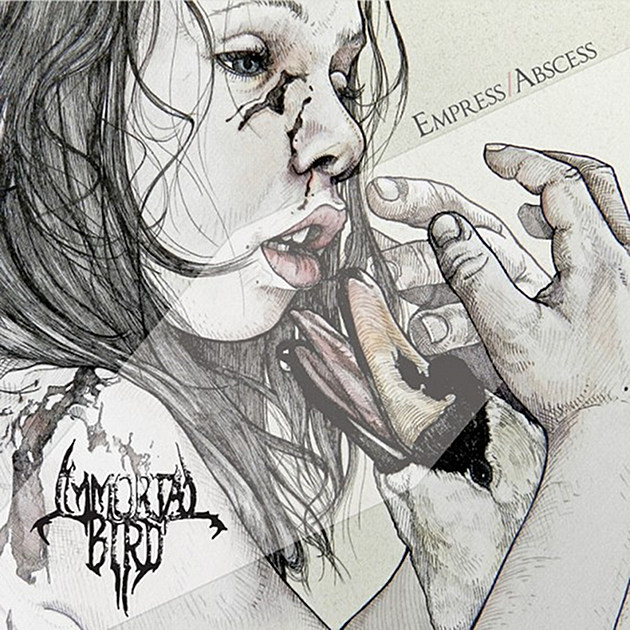
Immortal Bird - Empress/Abscess
…
Rae Amitay sounds furious, both at herself and at other people. Who, exactly? I don’t know. There’s a long list of potential targets, judging by her vocal performance on Empress/Abscess, the first full-length album by Chicago polygenre-inclined grind outfit Immortal Bird.
It seems disingenuous to put so much focus on Amitay—fewer people mention her co-writer, guitarist Evan Berry—but she’s the voice of the project, and therefore its emotional center, and Empress/Abscess is remarkable for its ability to evoke feeling as much as its musical performances.
Duality, sonically and lyrically, drives Immortal Bird’s music; it’s what makes the music so interesting to listen to. Echoing the record’s title, Amitay’s characters switch between authoritative (“It seems that we’ve reached an impasse / A rock and a hard place / I’ll choose the latter / I was born there,” she screams on opener “Neoplastic”) and self-damaging (“I’ve wasted years with invertebrates […] The idea of redemption is insulting / But you know that,” from “A Watery Grave”).
In kind, the music itself is similarly chiaroscuro. During a relatively short timeframe (five songs and just over a half hour of music) the band oscillates between extremes of melody and tempo, chaos and order.
The members of Immortal Bird wear their influences on their sleeves, and in so doing paint with an expansive palette of styles and sounds. Empress/Abscess presents itself at first as a pretty straightforward exploration of metallic hardcore with a little Norwegian melody thrown in, but ends with “And Send Fire,” a ten-plus minute prog-and-melodic-death-metal cocktail—complete with a little noise collage garnish, courtesy of producer Colin Marston. Before that, straightforward D-beats fall away into more Meshuggah-esque grooves (no djent-ish guitar tones here, thankfully) on “Saprophyte,” and tender gothic pianos provide an accent and moment of respite on “To a Watery Grave.” Many of the overdriven guitar arpeggios which open several songs here owe much to Pig Destroyer and Converge (Kurt Ballou mixed the band’s first release, 2013’s Akrasia EP).
In other words, Immortal Bird offers a lot to unpack in a small package, but underneath all the wrapping paper is anger—the touchstone that keeps the tone consistent while the music diverges. Sometimes that anger is directed outward, as on the rollicking and immediately mosh-friendly “Sycophant.” Otherwise the rage is internal and rooted in memory—“Weakening my impact / Bludgeoning resilience / I offered tender flesh / You brought your heavy hands” broods the speaker on “Saprophyte.”
According to the group’s Bandcamp “Immortal Bird is the result of choosing rage over sadness,” which seems a bit misleading as the band so often plays with both in the same song, but also underscores how central the act of feeling is to the Immortal Bird experience.
Much of the music that informs Immortal Bird eschews feeling. The violence in death metal and grindcore often spills over from catharsis into caricature and parody while black metal posits unfeeling coldness as something to achieve and applaud; even the empowerment screeds in some hardcore can come across as parroting self-help escapism.
It is to the band’s credit that their music embraces the human condition—not as a sensory exercise, but as a series of memories and reactions to them. Immortal Bird lives in the real world, and I like that about them (“You are an altogether new kind of trigger warning” goes one particularly poignant and witty line from “Sycophant”).
This kind of emotional songwriting is often pushed against by some members of the metal underground.
There is a strain of thought that posits emotionality as the province of more commercialized music, and therefore unfit for expression in the independent, extreme music sphere. It is expressed in people who might try to sexualize Immortal Bird in the interest of making their music seem diminutive (as some already have).
To my thinking, that attitude is retroactive; it views music as a series of adjectives to be sorted into positive and negative categories, instead of as complex constructs that can affect listeners in a meaningful way. It values music only as something to be consumed, and not parsed apart or discussed.
Immortal Bird’s Empress/Abscess is not a collection of music to only be consumed. It’s a densely layered meditation on anger and abuse, and an equally challenging collage of extreme music sub-genres.
…
…
Empress/Abscess is available today via Broken Limbs/Manatee Rampage. Follow Immortal bird on Facebook here, on Instagram at @immortalbird and on twitter at @immortalbirdbnd.
…












